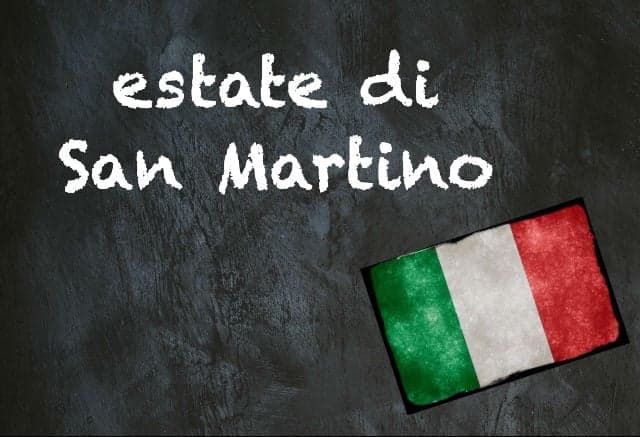Italian expression of the day: 'Estate di San Martino'

Thank heavens there's a word for Italy's sunny November weather.
A spell of sunny, spring-like weather in November isn't all that unusual in Italy.
In fact, it has a name. We're talking about l'estate di San Martino, 'St Martin's summer', named for the saint whose day falls on November 11th.
Catholic lore tells us that back when St Martin was plain old Martin, a soldier serving in the Roman army, he met a beggar shivering from the cold. He cut his own thick cloak in two with his sword and handed half to the freezing man.
Some accounts say Jesus miraculously restored the other half of Martin's cloak. But another version, the origin of today's phrase, says that Martin then encountered a second beggar and gave away the second half of his cloak too. As acknowledgement of his good deed, God sent sudden, glorious sunshine so that Martin wouldn't suffer from the cold.
Tradition has it that St Martin's feast day coincides each year with a spell of warmer weather, even after the first frosts have set in.

Mid-November sunshine in Rome. Photo: Alberto Pizzoli/AFP
Italians call this phenomenon 'St Martin's summer', and it's as brief as it is beautiful. According to one old proverb:
L'estate di San Martino dura tre giorni e un pochinino.
St Martin's summer lasts three days and a bit.
In fact, there's a wealth of sayings around St Martin's Day, many of them agricultural. Sicilians, for instance, say:
A San Martinu, favi e linu.
On St Martin, [remember to plant] beans and flax.
Or for those with vineyards:
Chi vuol far buon vino, zappi e poti a San Martino.
Whoever wants to make good wine, hoe and prune at St Martin's time.
But as non-farming folk, we prefer this directive to those on the other side of the vine:
A San Martino, si lascia l'acqua e si beve il vino.
At St Martin's time, leave water and drink wine.
Now that's a saying worth remembering.
Do you have an Italian word you'd like us to feature? If so, please email us with your suggestion.
Don’t miss any of our Italian words and expressions of the day: download our new app (available on Apple and Android) and then select the Italian Word of the Day in your Notification options via the User button.
Comments
See Also
A spell of sunny, spring-like weather in November isn't all that unusual in Italy.
In fact, it has a name. We're talking about l'estate di San Martino, 'St Martin's summer', named for the saint whose day falls on November 11th.
Catholic lore tells us that back when St Martin was plain old Martin, a soldier serving in the Roman army, he met a beggar shivering from the cold. He cut his own thick cloak in two with his sword and handed half to the freezing man.
Some accounts say Jesus miraculously restored the other half of Martin's cloak. But another version, the origin of today's phrase, says that Martin then encountered a second beggar and gave away the second half of his cloak too. As acknowledgement of his good deed, God sent sudden, glorious sunshine so that Martin wouldn't suffer from the cold.
Tradition has it that St Martin's feast day coincides each year with a spell of warmer weather, even after the first frosts have set in.

Mid-November sunshine in Rome. Photo: Alberto Pizzoli/AFP
Italians call this phenomenon 'St Martin's summer', and it's as brief as it is beautiful. According to one old proverb:
L'estate di San Martino dura tre giorni e un pochinino.
St Martin's summer lasts three days and a bit.
In fact, there's a wealth of sayings around St Martin's Day, many of them agricultural. Sicilians, for instance, say:
A San Martinu, favi e linu.
On St Martin, [remember to plant] beans and flax.
Or for those with vineyards:
Chi vuol far buon vino, zappi e poti a San Martino.
Whoever wants to make good wine, hoe and prune at St Martin's time.
But as non-farming folk, we prefer this directive to those on the other side of the vine:
A San Martino, si lascia l'acqua e si beve il vino.
At St Martin's time, leave water and drink wine.
Now that's a saying worth remembering.
Do you have an Italian word you'd like us to feature? If so, please email us with your suggestion.
Don’t miss any of our Italian words and expressions of the day: download our new app (available on Apple and Android) and then select the Italian Word of the Day in your Notification options via the User button.

Join the conversation in our comments section below. Share your own views and experience and if you have a question or suggestion for our journalists then email us at [email protected].
Please keep comments civil, constructive and on topic – and make sure to read our terms of use before getting involved.
Please log in here to leave a comment.